-
 Bitcoin
Bitcoin $84,437.5835
0.52% -
 Ethereum
Ethereum $1,595.7301
0.81% -
 Tether USDt
Tether USDt $0.9996
-0.03% -
 XRP
XRP $2.0966
0.71% -
 BNB
BNB $585.8443
1.09% -
 Solana
Solana $133.3956
5.93% -
 USDC
USDC $0.9997
-0.04% -
 TRON
TRON $0.2469
-2.88% -
 Dogecoin
Dogecoin $0.1563
1.92% -
 Cardano
Cardano $0.6164
1.64% -
 UNUS SED LEO
UNUS SED LEO $9.4393
0.44% -
 Chainlink
Chainlink $12.4519
2.06% -
 Avalanche
Avalanche $19.2827
2.05% -
 Toncoin
Toncoin $2.9578
3.42% -
 Stellar
Stellar $0.2370
0.71% -
 Shiba Inu
Shiba Inu $0.0...01190
2.27% -
 Sui
Sui $2.0992
0.55% -
 Hedera
Hedera $0.1595
1.04% -
 Bitcoin Cash
Bitcoin Cash $333.1464
3.75% -
 Polkadot
Polkadot $3.6476
3.53% -
 Litecoin
Litecoin $74.9463
-0.39% -
 Hyperliquid
Hyperliquid $16.4813
8.05% -
 Dai
Dai $0.9999
-0.01% -
 Bitget Token
Bitget Token $4.3661
0.98% -
 Ethena USDe
Ethena USDe $0.9990
-0.03% -
 Pi
Pi $0.6051
-2.37% -
 Monero
Monero $217.2967
-0.90% -
 Uniswap
Uniswap $5.2082
0.84% -
 OKB
OKB $51.2380
-1.86% -
 Pepe
Pepe $0.0...07271
2.15%
What is sharding? What impact does it have on blockchain?
Sharding scales blockchains by dividing them into smaller, parallel-processing shards, boosting transaction throughput, speeding up confirmations, and improving scalability. However, it adds complexities to consensus and data availability.
Mar 05, 2025 at 08:42 am
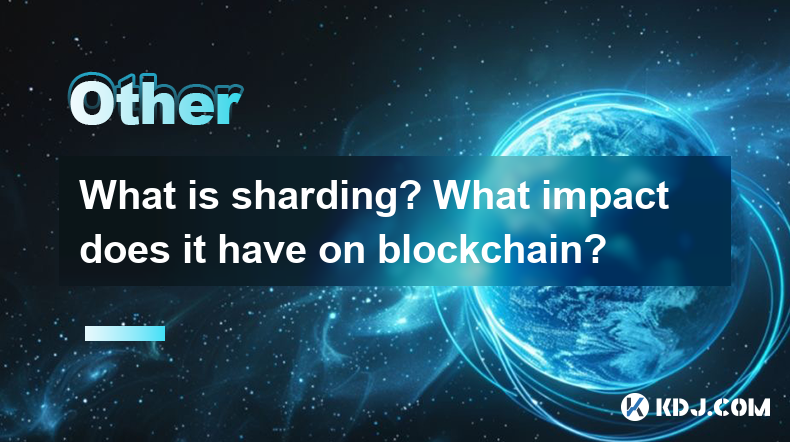
Key Points:
- Sharding is a scaling solution for blockchains that divides the network into smaller, more manageable groups called shards.
- Each shard processes a subset of transactions, significantly increasing throughput.
- Sharding improves transaction speed and reduces latency.
- It also enhances scalability, allowing blockchains to handle a much larger number of users and transactions.
- However, sharding introduces complexities in consensus mechanisms and data availability.
What is Sharding? What impact does it have on blockchain?
Sharding is a crucial scaling solution designed to address the inherent limitations of traditional blockchain architectures. Blockchains, in their basic form, process every transaction on every node. As the number of transactions and users grows, this process becomes increasingly slow and inefficient. Sharding elegantly tackles this problem by dividing the blockchain into smaller, parallel-processing subsets known as shards.
Imagine a large database needing to be accessed by many users simultaneously. Without sharding, each query would have to be processed by every node, leading to significant delays. With sharding, the database is split into smaller segments, and each user or a group of users accesses only the relevant segment. This dramatically speeds up the process. Similarly, in a sharded blockchain, each shard processes a subset of transactions independently.
This division of labor significantly boosts the transaction throughput of the blockchain. Instead of a single node processing all transactions, multiple shards process transactions concurrently, dramatically increasing the number of transactions the blockchain can handle per second. This enhanced throughput directly translates to faster transaction confirmation times and reduced network congestion.
The impact of sharding on transaction speed and latency is profound. Traditional blockchains often suffer from slow transaction speeds, particularly during periods of high network activity. Sharding mitigates this by distributing the processing load across multiple shards. This leads to significantly reduced latency, meaning users experience faster confirmation times for their transactions.
Sharding's impact on scalability is transformative. Blockchains that implement sharding can handle a far greater number of users and transactions than their non-sharded counterparts. This increased capacity is vital for the widespread adoption of blockchain technology, enabling it to power large-scale decentralized applications (dApps) and systems. This opens doors for applications that require high transaction throughput and low latency, such as decentralized exchanges (DEXs) and supply chain management systems.
However, sharding is not without its challenges. Implementing sharding requires careful consideration of the consensus mechanism. Ensuring consistency and security across multiple shards is complex and necessitates sophisticated protocols to maintain data integrity and prevent malicious actors from exploiting vulnerabilities.
One of the key complexities in sharding is ensuring data availability. Since each shard only holds a portion of the blockchain's data, there's a risk that some data might become inaccessible if a shard fails. Robust mechanisms are needed to ensure that all data remains available and accessible to all participants in the network, even in the event of shard failures. This often involves complex data replication and retrieval strategies.
Cross-shard communication is another area requiring careful design. Transactions often involve interactions between different shards. Efficient and secure mechanisms are needed to facilitate communication and data transfer between shards without compromising performance or security. Poorly designed cross-shard communication can become a bottleneck, negating some of the benefits of sharding.
Another crucial aspect is the selection of shard assignment strategies. Efficient shard assignment is crucial for load balancing and preventing certain shards from becoming overloaded while others remain underutilized. Algorithms and strategies for assigning transactions to shards need to be carefully designed to optimize performance and ensure fairness across the network.
The complexity of sharding implementation also necessitates significant development effort and resources. Developing, testing, and deploying a sharded blockchain is a considerably more complex undertaking than deploying a non-sharded blockchain. This requires specialized expertise and significant investment in infrastructure and development.
Despite these complexities, the benefits of sharding are undeniable. It represents a significant step forward in scaling blockchain technology and unlocking its full potential for a wider range of applications. As research and development continue, we can expect to see increasingly sophisticated and efficient sharding solutions emerging, paving the way for a more scalable and performant blockchain ecosystem.
Frequently Asked Questions:
Q: What are the advantages of sharding?
A: Sharding offers several key advantages, including increased transaction throughput, faster transaction speeds, reduced latency, and improved scalability, enabling blockchains to handle a significantly larger number of users and transactions.
Q: What are the disadvantages of sharding?
A: Implementing sharding introduces complexities in consensus mechanisms, data availability, cross-shard communication, and shard assignment strategies, requiring significant development effort and resources.
Q: How does sharding improve transaction speed?
A: Sharding improves transaction speed by distributing the processing load across multiple shards, enabling parallel processing of transactions, thus reducing the overall processing time.
Q: What is the impact of sharding on scalability?
A: Sharding dramatically improves scalability, allowing blockchains to handle a much larger number of users and transactions compared to non-sharded blockchains. This is crucial for wider adoption of blockchain technology.
Q: What are some examples of blockchains using sharding?
A: While full sharding implementations are still relatively rare, several projects are actively developing and deploying sharding solutions. Research into and implementation of sharding is ongoing across many different blockchain projects. Specific examples are often subject to change and new projects emerge frequently.
Q: Is sharding a perfect solution for scaling blockchains?
A: While sharding offers significant improvements in scalability and performance, it's not a perfect solution. It introduces complexities and challenges that require careful consideration and sophisticated solutions. It is one of many approaches to scaling blockchains.
Disclaimer:info@kdj.com
The information provided is not trading advice. kdj.com does not assume any responsibility for any investments made based on the information provided in this article. Cryptocurrencies are highly volatile and it is highly recommended that you invest with caution after thorough research!
If you believe that the content used on this website infringes your copyright, please contact us immediately (info@kdj.com) and we will delete it promptly.
- Mutuum Finance (MUTM) Demonstrates Rapid Growth
- 2025-04-17 19:15:12
- PEPE (slang for "people eating potatoes")
- 2025-04-17 19:15:12
- Panama City to accept cryptocurrency payments for taxes and municipal fees
- 2025-04-17 19:10:16
- Pi Network (PI) token price plunges 17% as broader cryptocurrency market faces instability
- 2025-04-17 19:10:16
- Cardano (ADA) Price Prediction: Could It Reach Its All-Time High of $3?
- 2025-04-17 19:10:14
- Tariffs have recently been the topic of both significant policy recommendations and casual conversations.
- 2025-04-17 19:10:14
Related knowledge
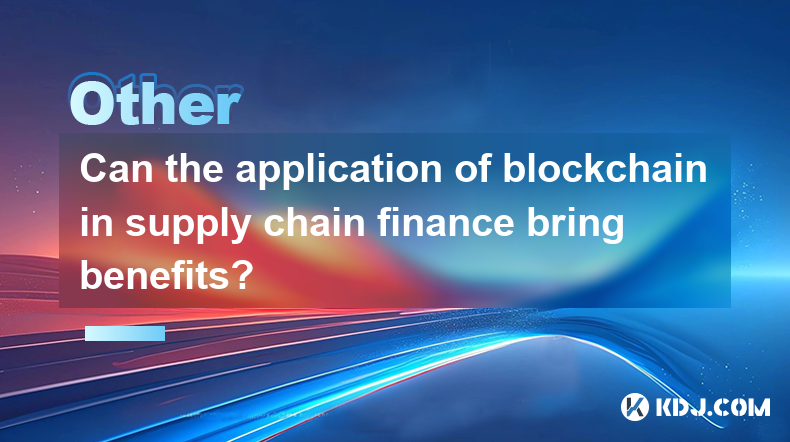
Can the application of blockchain in supply chain finance bring benefits?
Apr 15,2025 at 04:00pm
Can the application of blockchain in supply chain finance bring benefits? The integration of blockchain technology into supply chain finance has garnered significant attention in the cryptocurrency and financial sectors. This article explores how blockchain can potentially revolutionize supply chain finance, detailing its benefits and providing a compre...

Does the ranking of Chinese blockchain apps include cross-chain applications?
Apr 14,2025 at 04:00pm
The ranking of Chinese blockchain apps is a comprehensive evaluation that takes into account various aspects such as user base, transaction volume, and technological innovation. A pertinent question arises regarding whether these rankings include cross-chain applications. Cross-chain applications, which allow different blockchain networks to interact an...
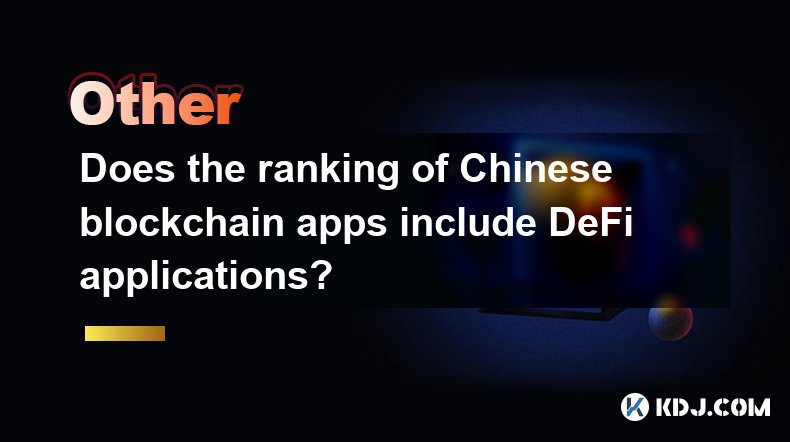
Does the ranking of Chinese blockchain apps include DeFi applications?
Apr 15,2025 at 06:57am
The ranking of Chinese blockchain apps is a comprehensive list that showcases the most popular and influential applications within the cryptocurrency ecosystem. One question that often arises is whether these rankings include DeFi applications. To answer this, we need to delve into the specifics of how these rankings are compiled and what types of appli...
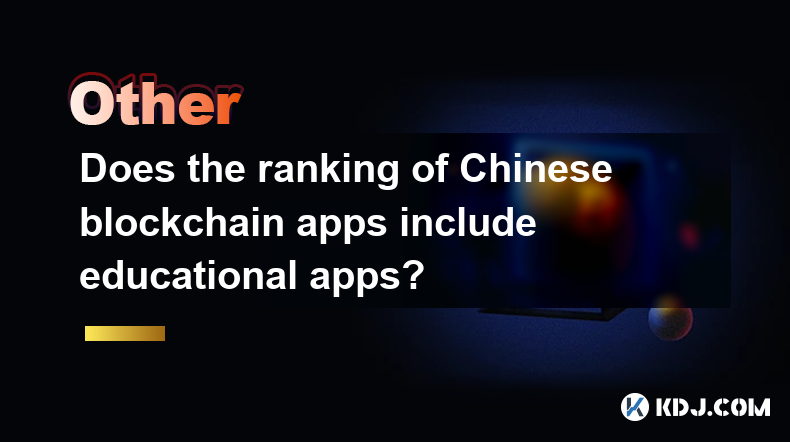
Does the ranking of Chinese blockchain apps include educational apps?
Apr 16,2025 at 03:35am
The ranking of Chinese blockchain apps often includes a variety of categories, from finance and gaming to social networking and beyond. One question that frequently arises is whether these rankings include educational apps. To address this, we need to delve into the specifics of how blockchain apps are categorized and ranked in China, and whether educat...
Does the ranking of Chinese blockchain apps include enterprise-level applications?
Apr 15,2025 at 06:42am
The ranking of Chinese blockchain apps often includes a variety of applications, ranging from consumer-focused to enterprise-level solutions. Understanding the scope and criteria for these rankings is essential to determine if enterprise-level applications are included. This article delves into the specifics of how Chinese blockchain app rankings are co...
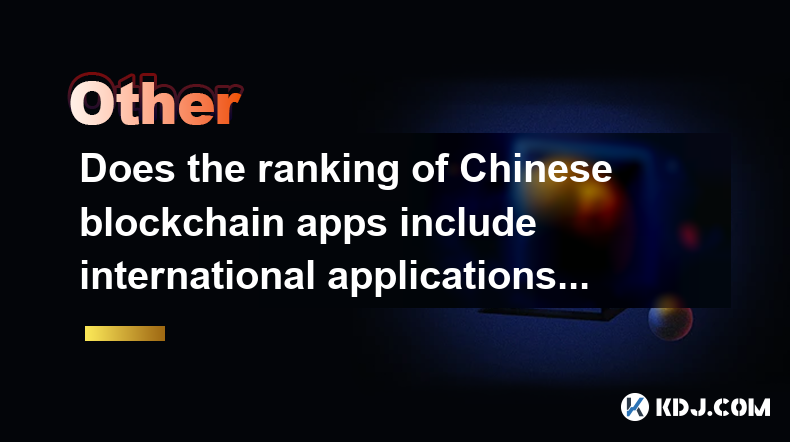
Does the ranking of Chinese blockchain apps include international applications?
Apr 16,2025 at 04:07am
The ranking of Chinese blockchain apps primarily focuses on applications developed and predominantly used within China. However, the question of whether these rankings include international applications is an intriguing one that warrants a detailed exploration. In this article, we will delve into the criteria used for ranking Chinese blockchain apps, th...

Can the application of blockchain in supply chain finance bring benefits?
Apr 15,2025 at 04:00pm
Can the application of blockchain in supply chain finance bring benefits? The integration of blockchain technology into supply chain finance has garnered significant attention in the cryptocurrency and financial sectors. This article explores how blockchain can potentially revolutionize supply chain finance, detailing its benefits and providing a compre...

Does the ranking of Chinese blockchain apps include cross-chain applications?
Apr 14,2025 at 04:00pm
The ranking of Chinese blockchain apps is a comprehensive evaluation that takes into account various aspects such as user base, transaction volume, and technological innovation. A pertinent question arises regarding whether these rankings include cross-chain applications. Cross-chain applications, which allow different blockchain networks to interact an...

Does the ranking of Chinese blockchain apps include DeFi applications?
Apr 15,2025 at 06:57am
The ranking of Chinese blockchain apps is a comprehensive list that showcases the most popular and influential applications within the cryptocurrency ecosystem. One question that often arises is whether these rankings include DeFi applications. To answer this, we need to delve into the specifics of how these rankings are compiled and what types of appli...

Does the ranking of Chinese blockchain apps include educational apps?
Apr 16,2025 at 03:35am
The ranking of Chinese blockchain apps often includes a variety of categories, from finance and gaming to social networking and beyond. One question that frequently arises is whether these rankings include educational apps. To address this, we need to delve into the specifics of how blockchain apps are categorized and ranked in China, and whether educat...

Does the ranking of Chinese blockchain apps include enterprise-level applications?
Apr 15,2025 at 06:42am
The ranking of Chinese blockchain apps often includes a variety of applications, ranging from consumer-focused to enterprise-level solutions. Understanding the scope and criteria for these rankings is essential to determine if enterprise-level applications are included. This article delves into the specifics of how Chinese blockchain app rankings are co...

Does the ranking of Chinese blockchain apps include international applications?
Apr 16,2025 at 04:07am
The ranking of Chinese blockchain apps primarily focuses on applications developed and predominantly used within China. However, the question of whether these rankings include international applications is an intriguing one that warrants a detailed exploration. In this article, we will delve into the criteria used for ranking Chinese blockchain apps, th...
See all articles























































































